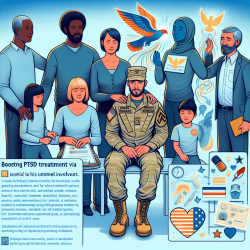Introduction
Posttraumatic Stress Disorder (PTSD) is a significant issue affecting many veterans, with profound impacts on their lives and those around them. Recent research has highlighted the potential benefits of involving family members in PTSD treatment, specifically through Prolonged Exposure (PE) therapy. This blog delves into the findings of a randomized clinical trial examining the effects of family involvement in PE and offers practical insights for practitioners seeking to enhance treatment outcomes.
The Study: Family Involvement in PTSD Treatment
The study titled "Can families help veterans get more from PTSD treatment? A randomized clinical trial examining Prolonged Exposure with and without family involvement" explores the efficacy of integrating family members into PE therapy. Conducted across three VA facilities, the trial involved 156 veterans with significant PTSD symptoms. Participants were randomized to receive either standard PE or Family-Supported PE, where a family member attended initial therapy sessions.
Key Findings
- Increased Adherence: Veterans who participated in Family-Supported PE showed higher session attendance and homework compliance compared to those in standard PE. This suggests that family involvement can significantly boost treatment adherence.
- Improved Outcomes: Family-Supported PE was more effective in reducing PTSD severity and associated symptoms, such as depression, compared to standard PE.
- Enhanced Support: The presence of a family member provided additional emotional and practical support, creating a conducive environment for therapy.
Implications for Practitioners
For practitioners, these findings underscore the importance of considering family dynamics in PTSD treatment. Here are some practical steps to implement family involvement in therapy:
- Initial Sessions: Encourage family members to attend the first few therapy sessions. This helps them understand the treatment process and their role in supporting the veteran.
- Communication Skills: Train both veterans and their family members in effective communication techniques. This can facilitate better support and collaboration throughout the treatment.
- Homework Support: Family members can assist veterans with therapy homework, ensuring they stay engaged and motivated.
Encouraging Further Research
While this study provides valuable insights, it also highlights the need for further research into the most effective ways to integrate family members into PTSD treatment. Practitioners are encouraged to explore additional strategies and share their findings to build a robust evidence base for family-supported interventions.
Conclusion
Family involvement in PTSD treatment offers a promising avenue for improving outcomes for veterans. By integrating loved ones into therapy, practitioners can enhance adherence, reduce symptoms, and foster a supportive environment for recovery. As we continue to learn more about the benefits of family-supported interventions, it is crucial to apply these insights in clinical practice and further research.
To read the original research paper, please follow this link: Can families help veterans get more from PTSD treatment? A randomized clinical trial examining Prolonged Exposure with and without family involvement.










